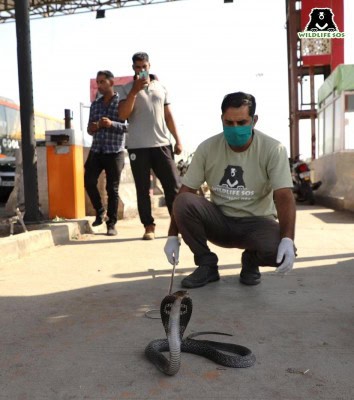 Agra, Oct 3 : A five-foot-long Cobra snake created quite a stir at the Inner Ring Road toll plaza on the Agra-Lucknow Expressway.
Agra, Oct 3 : A five-foot-long Cobra snake created quite a stir at the Inner Ring Road toll plaza on the Agra-Lucknow Expressway.
The snake was safely rescued by Wildlife SOS on Friday.
Guards at the toll plaza had spotted a large cobra near a booth which had later made its way into a drainpipe on the side of the toll plaza.
The authorities had to temporarily seal the toll booth while the Wildlife SOS team set out for the rescue operation. Sensing that the team was trying to capture it, the cobra flared its hood in an attempt to defend itself. After ensuring that everyone was at a safe distance from the agitated reptile, the team successfully extricated the cobra and then carefully transferred it into a safe transport container.
In another incident, a checkered keelback snake was found hitching a quick ride on a country boat at Renuka Ghat in Runakta. The snake was found under the passenger seats by the boatman who immediately placed a call to the NGO’s 24×7 emergency helpline.
In an operation that lasted over two hours, the Wildlife rescuers had to employ extreme caution while extracting the keelback from its hiding place. It was later released into a safe habitat after being kept under observation for a few hours.
The checkered keelback (Fowlea piscator), also known commonly as the Asiatic water snake, is a non-venomous snake endemic to Asia. Their preferred habitat is in or near freshwater lakes and rivers, feeding mainly on small fish and water frogs. They’re also common in open wells, irrigation tanks and ponds.
Sonu, the boatman who found the snake said, “I am aware that this particular snake is not venomous but passengers of my boat were quite scared to see the snake.”
Kartick Satyanarayan, Wildlife SOS co-founder and CEO said, “The checkered keelback is the most frequently encountered semi-aquatic snake in India. In urban spaces, these snakes are found in gardens, sewers, backyards, etc. This species tends to mimic the Indian cobra by raising its head up in a defensive stance.”
Baiju Raj MV, Director Conservation Projects, said, “Rescues involving reptiles are highly sensitive and sometimes even risky, hence the necessity of having trained rescuers carry out such sensitive operations, in the interest of public safety and protection of urban wildlife.”
Disclaimer: This story is auto-generated from IANS service.

